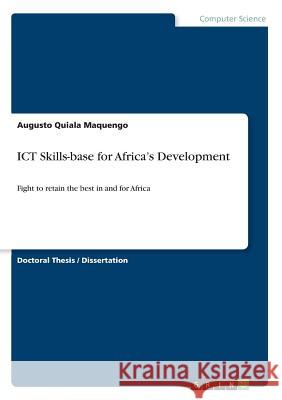ICT Skills-base for Africa's Development: Fight to retain the best in and for Africa » książka
ICT Skills-base for Africa's Development: Fight to retain the best in and for Africa
ISBN-13: 9783640502042 / Angielski / Miękka / 2010 / 94 str.
ICT Skills-base for Africa's Development: Fight to retain the best in and for Africa
ISBN-13: 9783640502042 / Angielski / Miękka / 2010 / 94 str.
(netto: 253,58 VAT: 5%)
Najniższa cena z 30 dni: 252,42
ok. 16-18 dni roboczych
Bez gwarancji dostawy przed świętami
Darmowa dostawa!
Doctoral Thesis / Dissertation from the year 2009 in the subject Computer Science - Applied, grade: 3.89, Atlantic International University (Faculty of Economics), course: Economic Development, language: English, abstract: Executive Summary This assessment outlines the challenges of retaining and attracting high-skilled professionals, briefly assesses both the -brain gain- and the -brain drain- in the health sector, and examines some of the existing programs that encourage return. It provides an overview of the role of the Diaspora in fostering the transfer of knowledge, technology, capital, and remittances. The assessment also looks into the policy implications in each African country and how those policies can attract the Diaspora that is well established in the Western countries. It draws attention to the principle role of ICT for development bringing insights on the skills needed to embark on a development agenda by attracting the best trained African highly skilled Professionals in the areas. Another essential element has been the economic development of many previously less developed countries. As a result, many goods previously produced primarily by lower-skilled factory workers in the OECD countries are now produced in less developed countries. The globalization of the world economy has altered the international specialization in production. This has increased the demand for high-skilled workers in the advanced economies, but decreased the demand in those economies for lower-skilled workers whose -jobs have been shipped overseas.- Finally, the immigration policies of some of the advanced economies have exacerbated the increase in skill differentials by fostering the migration of low-skilled workers. -Family reunification- policies bring family members of earlier immigrants and guest workers to the destination and they tend to be lower skilled. Policies to counteract the aging of the population have also tended to focus on attracting lower skilled worke











